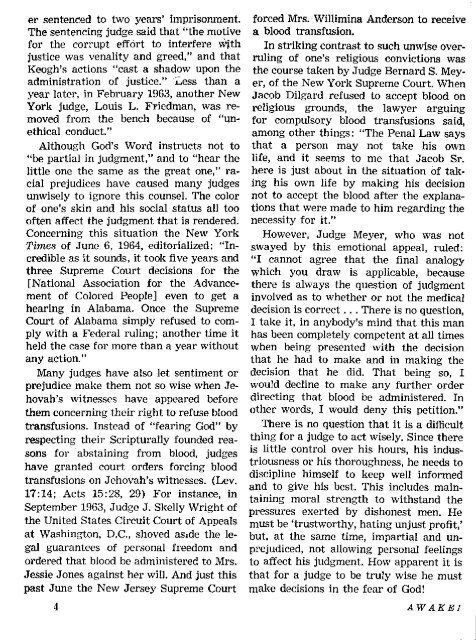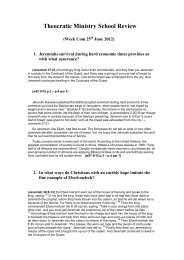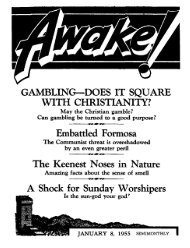1964 Awake! - Theocratic Collector.com
1964 Awake! - Theocratic Collector.com
1964 Awake! - Theocratic Collector.com
Create successful ePaper yourself
Turn your PDF publications into a flip-book with our unique Google optimized e-Paper software.
er sentenced to two years' imprisonment.<br />
The sentencing judge said that "the motive<br />
for the corrupt effort to interfere With<br />
justice was venality and greed," and that<br />
Keogh's actions "cast a shadow upon the<br />
administration of justice." -L.ess than a<br />
year later, in February 1963, another New<br />
York judge, Louis L. Friedman, was re·<br />
moved from the bench because of "un·<br />
ethical conduct."<br />
Although God's Word instructs not to<br />
"be partial in judgment," and to "hear the<br />
little one the same as the great one," ra·<br />
cial prejudices have caused many judges<br />
Wlwisely to ignore this counsel. The color<br />
of one's skin and his social status all too<br />
often affect the judgment that is rendered.<br />
Concerning this situation the New York<br />
Time8 of June 6, <strong>1964</strong>, editorialized: "In·<br />
credible as it sounds, it took five years and<br />
three Supreme Court decisions for the<br />
[National Association for the Advancement<br />
of Colored People] even to get a<br />
hearing in Alabama. Once the Supreme<br />
Court of Alabama simply refused to <strong>com</strong>·<br />
ply with a Federal ruling; another time it<br />
held the case for more than a year without<br />
any action."<br />
Many judges have also let sentiment or<br />
prejudice make them not so wise when Jehovah's<br />
witnesses have appeared before<br />
them concerning their right to refuse blood<br />
transfusions. Instead of "fearing God" by<br />
respecting their Scripturally founded reasons<br />
for abstaining from blood, judges<br />
have granted court orders forcing blood<br />
transfusions on Jehovah's witnesses. (Lev.<br />
17:14; Acts 15:28, 29) For instance, in<br />
September 1963, Judge J. Skelly Wright of<br />
the United States Circuit Court of Appeals<br />
at Washington, D.C., shoved aSIde the legal<br />
guarantees of personal freedom and<br />
ordered that blood be administered to Mrs.<br />
Jessie Jones against her will. And just this<br />
past June the New Jersey Supreme Court<br />
4<br />
forced Mrs. Willimina Anderson to receive<br />
a blood transfusion.<br />
In striking contrast to such unwise overruling<br />
of one's religious convictions was<br />
the course taken by Judge Bernard S. Meyer,<br />
of the New York Supreme Court. When<br />
Jacob Dilgard refused to accept blood on<br />
religious grounds, the lawyer arguing<br />
for <strong>com</strong>pulsory blood transfusions said,<br />
among other things: "The Penal Law says<br />
that a person may not take his own<br />
life, and it seems to me that Jacob Sr.<br />
here is just about in the situation of taking<br />
his own life by making his decision<br />
not to accept the blood after the explanations<br />
that were made to him regarding the<br />
necessity for it."<br />
However, Judge Meyer, who was not<br />
swayed by this emotional appeal, ruled:<br />
"I cannot agree that the final analog:y<br />
which you draw is applicable, because<br />
there is always the question of judgment<br />
involved as to whether or not the medical<br />
decision is correct ... There is no question,<br />
I take it, in anybody's mind that this man<br />
has been <strong>com</strong>pletely <strong>com</strong>petent at all times<br />
when being presented with the decision<br />
that he had to make and in making the<br />
decision that he did. That being so, I<br />
would decline to make any further order<br />
directing that blood be administered. In<br />
other words, I would deny this petition."<br />
There is no question that it is a difficult<br />
thing for a judge to act wisely. Since there<br />
is little control over his hours, his industriousness<br />
or his thoroughness, he needs to<br />
discipline himself to keep well informed<br />
and to give his best. This includes main·<br />
taining moral strength to withstand the<br />
pressures exerted by dishonest men. He<br />
must be 'trustworthy, hating unjust profit,'<br />
but, at the same time, impartial and unprejudiced,<br />
not allowing personal feelings<br />
to affect his jUdgment. How apparent it is<br />
that for a judge to be truly wise he must<br />
make decisions in the fear of God!<br />
AWAKE!




